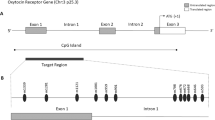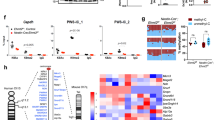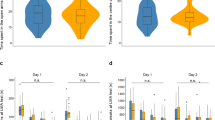Abstract
Prader–Willi syndrome (PWS) is a genetic disorder caused by the absence of expression of the paternal copy of maternally imprinted genes in chromosome region 15q11–13. The genetic subtypes of PWS are classified into deletion (∼70%), maternal uniparental disomy (mUPD; 25–30%), imprinting center defects (3–5%) and rare unbalanced translocations. Recently, Matsubara et al. reported a significantly higher maternal age in a trisomy rescue (TR) or gamete complementation (GC) by nondisjunction at maternal meiosis 1 (M1) group than in a deletion group. In the present study, we try to confirm their findings in an ethnically different population. A total of 97 Korean PWS patients were classified into deletional type (n=66), TR/GC (M1) (n=15), TR/GC by nondisjunction at maternal meiosis 2 (n=2), monosomy rescue or postfertilization mitotic nondisjunction (n=4) and epimutation (n=2). Maternal ages at birth showed a significant difference between the deletion group (median age of 29, interquartile range (IQR)=(27,31)) and the TR/GC (M1) group (median age of 35, IQR=(31,38)) (P<0.0001). The relative birth frequency of the TR/GC (M1) group has substantially increased since 2006 when compared with the period before 2005. These findings support the hypothesis that the advanced maternal age at childbirth is a predisposing factor for the development of mUPD because of increased M1 errors.
Similar content being viewed by others
Log in or create a free account to read this content
Gain free access to this article, as well as selected content from this journal and more on nature.com
or
References
Cassidy, S. B. Prader-Willi syndrome. J. Med. Genet. 34, 917–923 (1997).
Holm, V. A., Cassidy, S. B., Butler, M. G., Hanchett, J. M., Greenswag, L. R., Whitman, B. Y. et al. Prader-Willi syndrome: consensus diagnostic criteria. Pediatrics 91, 398–402 (1993).
Cassidy, S. B. & Driscoll, D. J. Prader-Willi syndrome. Eur. J. Hum. Genet. 17, 3–13 (2009).
Donaldson, M. D., Chu, C. E., Cooke, A., Wilson, A., Greene, S. A. & Stephenson, J. B. The Prader-Willi syndrome. Arch. Dis. Childhood 70, 58–63 (1994).
Kaplan, J., Fredrickson, P. A. & Richardson, J. W. Sleep and breathing in patients with the Prader-Willi syndrome. Mayo Clinic Proc. Mayo Clinic 66, 1124–1126 (1991).
Ledbetter, D. H., Riccardi, V. M., Airhart, S. D., Strobel, R. J., Keenan, B. S. & Crawford, J. D. Deletions of chromosome 15 as a cause of the Prader-Willi syndrome. N. Engl. J. Med. 304, 325–329 (1981).
Nicholls, R. D., Knoll, J. H., Butler, M. G., Karam, S. & Lalande, M. Genetic imprinting suggested by maternal heterodisomy in nondeletion Prader-Willi syndrome. Nature 342, 281–285 (1989).
Driscoll, D. J., Waters, M. F., Williams, C. A., Zori, R. T., Glenn, C. C., Avidano, K. M. et al. A DNA methylation imprint, determined by the sex of the parent, distinguishes the Angelman and Prader-Willi syndromes. Genomics 13, 917–924 (1992).
Cassidy, S. B., Lai, L. W., Erickson, R. P., Magnuson, L., Thomas, E., Gendron, R. et al. Trisomy 15 with loss of the paternal 15 as a cause of Prader-Willi syndrome due to maternal disomy. Am. J. Hum. Genet. 51, 701–708 (1992).
Jones, K. T. Meiosis in oocytes: predisposition to aneuploidy and its increased incidence with age. Hum. Reprod. Update 14, 143–158 (2008).
Matsubara, K., Murakami, N., Nagai, T. & Ogata, T. Maternal age effect on the development of Prader-Willi syndrome resulting from upd(15)mat through meiosis 1 errors. J. Hum. Genet. 56, 566–571 (2011).
Kubota, T., Das, S., Christian, S. L., Baylin, S. B., Herman, J. G. & Ledbetter, D. H. Methylation-specific PCR simplifies imprinting analysis. Nat. Genet. 16, 16–17 (1997).
Kim, H. J., Cho, H. J., Jin, D. K., Kwon, E. K., Ki, C. S., Kim, J. W. et al. Genetic basis of Prader-Willi syndrome in Korea: less uniparental disomy than has been recognized? Clin. Genet. 66, 368–372 (2004).
Procter, M., Chou, L. S., Tang, W., Jama, M. & Mao, R. Molecular diagnosis of Prader-Willi and Angelman syndromes by methylation-specific melting analysis and methylation-specific multiplex ligation-dependent probe amplification. Clin. Chem. 52, 1276–1283 (2006).
Harvard, C., Strong, E., Mercier, E., Colnaghi, R., Alcantara, D., Chow, E. et al. Understanding the impact of 1q21.1 copy number variant. Orphanet. J. Rare Dis. 6, 54 (2011).
Robinson, W. P., Kuchinka, B. D., Bernasconi, F., Petersen, M. B., Schulze, A., Brondum-Nielsen, K. et al. Maternal meiosis I non-disjunction of chromosome 15: dependence of the maternal age effect on level of recombination. Hum. Mol. Genet. 7, 1011–1019 (1998).
Akefeldt, A., Anvret, M., Grandell, U., Nordlinder, R. & Gillberg, C. Parental exposure to hydrocarbons in Prader-Willi syndrome. Dev. Med. Child Neurol. 37, 1101–1109 (1995).
Cassidy, S. B., Forsythe, M., Heeger, S., Nicholls, R. D., Schork, N., Benn, P. et al. Comparison of phenotype between patients with Prader-Willi syndrome due to deletion 15q and uniparental disomy 15. Am. J. Med. Genet. 68, 433–440 (1997).
Warburton, D. Biological aging and the etiology of aneuploidy. Cytogenet. Genome Res. 111, 266–272 (2005).
Sherman, S. L., Freeman, S. B., Allen, E. G. & Lamb, N. E. Risk factors for nondisjunction of trisomy 21. Cytogenet. Genome Res. 111, 273–280 (2005).
Robinson, W. P., Langlois, S., Schuffenhauer, S., Horsthemke, B., Michaelis, R. C., Christian, S. et al. Cytogenetic and age-dependent risk factors associated with uniparental disomy 15. Prenat. Diagn. 16, 837–844 (1996).
Acknowledgements
The study was supported by the Korea Healthcare Technology R&D Project funded by the Ministry of Health, Welfare and Family Affairs, Republic of Korea (grant number A080588), the Samsung Biomedical Research Institute (grant number C-A9-240-3) and the In-Sung Foundation for Medical Research.
Author information
Authors and Affiliations
Corresponding author
Rights and permissions
About this article
Cite this article
Yoon Cho, S., Ki, CS., Bae Sohn, Y. et al. The proportion of uniparental disomy is increased in Prader–Willi syndrome due to an advanced maternal childbearing age in Korea. J Hum Genet 58, 150–154 (2013). https://doi.org/10.1038/jhg.2012.148
Received:
Revised:
Accepted:
Published:
Issue date:
DOI: https://doi.org/10.1038/jhg.2012.148
Keywords
This article is cited by
-
A female with typical fragile-X phenotype caused by maternal isodisomy of the entire X chromosome
Journal of Human Genetics (2020)
-
Exploring autism symptoms in an Australian cohort of patients with Prader-Willi and Angelman syndromes
Journal of Neurodevelopmental Disorders (2018)
-
Prenatal molecular testing for Beckwith–Wiedemann and Silver–Russell syndromes: a challenge for molecular analysis and genetic counseling
European Journal of Human Genetics (2016)
-
Imprinting methylation errors in ART
Reproductive Medicine and Biology (2014)
-
Advanced maternal age at childbirth and the development of uniparental disomy. A commentary on the proportion of uniparental disomy is increased in Prader–Willi syndrome due to an advanced maternal childbearing age in Korea
Journal of Human Genetics (2013)



